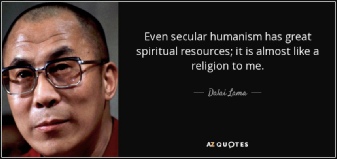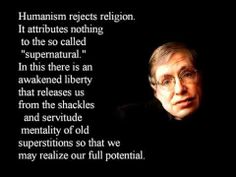




 NEXT
NEXT
 BACK
BACK

Philosophical musings on Quanta & Qualia; Materialism & Spiritualism; Science & Religion; Pragmatism & Idealism, etc.


 Forum
Forum

 Recent Posts
Recent Posts
Post 24. March 12, 2018 continued . . .
Re-Enlightenment
Secular Humanism or Neo-Deism?
The Quillette article notes this book's underlying assumption, “Pinker’s point, which is simply that reason offers a demon-strably more effective means of understanding the world than revealed wisdom, superstition, or faith-based belief.” However, while Reason is clearly better than Religion at engineering the physical world via Facts, due to long experience with managing masses of people, the ancient traditions still have the edge in manipulating the meta-physical world, via Faith. Defenders of Faith have always been, “wary of individual reason, and believed that only the collective wisdom generated over centuries provided a reliable form of trial-and-error.” In pre-scientific ages, that holistic synthesis of wisdom within specific cultures, collated in scriptures, was indeed the best source of wisdom. But now, our recieved wisdom can be supplemented, not only from many different cultures, but also with the fruits of reductive analysis in Science. Moreover, practical Science is getting closer to a handle on the Mind/Body combo. As we create our own thinking machines, we learn more about our own minds, our evolved biases, and our learned beliefs.
One negative critique of the book accused Pinker of “philoso-phism,” which he described as: “…the error of every man who denies the possibility of any mystery beyond the limits of reason.” Indeed, the gulf between knowledge and mystery was vast in the past. But as Science rapidly expands its scope of understanding, the mystical shadows are receding into dark corners. And that's where magical-mystery-mongers reside, hiding from the light of reason. Critics of pragmatic Modernism and idealistic Enlightenment values have tended to set up secular Reason as a Frankenstein strawman, with grasping claws, but lacking both heart and soul. But, I think that Pinker's proposed new/old paradigm should envisioned more like a Teddy Bear, as an open-armed Third Culture2, combining the intellect and the heart into a viable worldview for the fast approaching future, which is leaving religions in the dust of the past. We are now entering the Post-postmodern era.
Deism was an Enlightenment-inspired movement toward reconciliation of the two cultures of reductive Reason & holistic Feeling. But emotional zealots react passionately against any skeptical analysis of their unexamined sentiments. And rational radicals blithely ignore the protestations of the mindless herd. So the middle-of-the-road Third Culture will have to endure counter-attacks from both flanks. However, despite the frantic responses to his book, Pinker is not proposing to replace traditional religious and political institutions with scientific labor-atories. Instead, his favored alternative is Secular Humanism. “An endorsement of scientific thinking,” he writes, “must first of all be distinguished from any belief that members of the occupational guild called ‘science’ are particularly wise or noble.” It is humanism, he argues, which “provides the ought that supplements the is.”3
Pinker defines contemporary humanism as a movement with a non-supernatural basis for meaning and ethics. But his New Enlightenment morality could also fit into Neo-Deism, which acknowledges the supernatural origins of the world, yet also accepts the human responsibility for interpreting that world in ethical terms, without any heavenly assistance.
Post 24 continued . . . click Next
2. Third Culture :
In a second edition of The Two Cultures, published in 1963, novelist C.P.Snow added a new essay, "The Two Cultures: A Second Look," in which he optim-istically suggested that a new culture, a "third culture," would emerge and close the communications gap be-tween the literary intellect-uals and the scientists.
3. Is/Ought Fallacy :
David Hume asserted that you can’t prove an “ought” from an “is”. In other words, how Nature actually works may not be the way it ought to work, where human inter-ests are concerned. Real and Actual are far from Ideal and Desirable for human flourishing. That’s why Science & Engineering are constantly trying to improve on Nature.
https://en.wikipedia.org/wiki/Is%E2%80%93ought_problem
Dalai Lama, Buddhist
and
Steven Hawking, Atheist
on
Secular Humanism
click here for popup
Secular Deism :
Deism is secular in the sense of not being bound to a governing religious institution. However, I suspect that Secular Humanism and NeoDeism will have to tensely coexist until mutual distrusts fade and common-alities are accepted. Freethinking ND doesn’t require or expect everyone to believe in an abstract deity, who, in practical terms, is not much more than a metaphor or symbol.








 NEXT
NEXT
 BACK
BACK




 Recent Posts
Recent Posts


